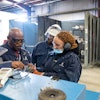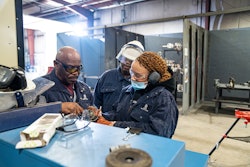Old Electronics From America, Europe Fuel Toxic Crisis in Africa
SEATTLE
According to an investigation conducted by Basel Action Network (BAN), old electronics from America and Europe are fueling a toxic crisis in Africa. Old computers, televisions, mobile phones and other used electronic equipment exported from the United States and Europe to Nigeria and other African countries are piling up in warehouses or being dumped and burned in empty lots, roadsides and swamps, creating serious health and environmental contamination. The contamination results from the toxic liquids and smoke produced by the disposal of the old equipment, according to BAN officials.
The photo-documentary report entitled “The Digital Dump: Exporting High-Tech Re-use and Abuse to Africa,” explores what is thought to be an escalating global trade in toxic, obsolete, discarded computers and other e-scrap. The electronics are collected in North America and Europe and sent to developing countries for “re-use and repair,” says the report. In Lagos, Nigeria, where there is a legitimate robust market and ability to repair and refurbish old electronic equipment, local officials say that as much as 75 percent of the estimated 500 40-foot containers shipped to the city monthly contain “junk” that is not economically repairable or marketable. Consequently, the hazardous e-waste is discarded and eventually burned.
“Re-use is a good thing, bridging the digital divide is a good thing, but exporting loads of technotrash in the name of these lofty ideals and seriously damaging the environment and health of poor communities in developing countries is criminal,” says Jim Puckett, coordinator of BAN and the leader of the investigation.
According to BAN, much of this trade is illegal under international rules governing trade in toxic waste. But many governments, including the United States, refuse to ratify, implement or properly enforce these rules. Proper enforcement would require all such e-scrap exports, whole or in parts, to be properly tested for functionality and certified to be going to re-use destinations rather than for disposal or recycling.
© Copyright 2005 by DiverseEducation.com















